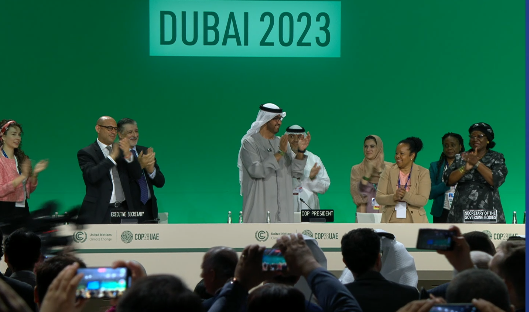
The United Nations Climate talks ended today after a 48 hours waiting game as usual, with plenaries being scheduled, and rescheduled at the last minute, followed by a long and four hours of lengthy procedures , and by delegates’ speeches. But this year was fundamentally different. The stakes were high for developed countries and big oil, gas, and coal producers and countries in particular. More than 2400 companies linked to fossil fuels were part of the UN Climate Talks. For observers, they were indirectly part of the negotiations. And it was challenging, they said.
The First Global stocktake adopted
The Global stocktake intends to inform on how the world will phase out from fossil fuels to the 1.5°C needed by the science. It aims also to know how all the countries, especially the developing countries will be helped to adapt and mitigate to climate change, but moreover to survive.
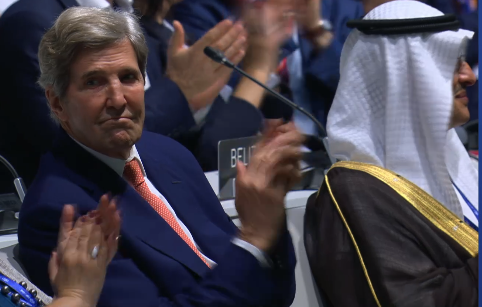
During these two weeks, the Alliance of Small Islands Developing States did not fail to impose themselves through public speeches by making themselves heard through different coalitions, typing the point on the negotiating table to make the planet react, explaining their thirty-years struggle to account for loss and damage. They also welcomed the first operationalization of the loss and damage fund at the opening ceremony of COP28 on november 30. They loudly voiced their disapproval of the last negotiating text on December 11. Yet they were dismissed at the last minute.
“We did not want to interrupt the standing ovation when we came to the room, but we are a little bit confused about what happened: it seems that you just gave the decision, but Small Islands Developing States were not in the room “, informed Anne Rasmussen, from the Ministry of Environment of SAMOA, representing the Alliance of Small Islands Developing States negotiating group at the UN Climate Convention.
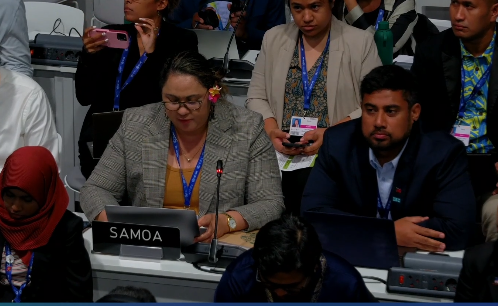
A few minutes earlier indeed at 8:13 local time, around three minutes after the opening plenary, the president of COP 28, Sultan Al Jaber called for an approbation of the text. ” I invite the CMA to adopt the Global Stocktake…here is not objection, it is so decided”, he said. Parties thus officially adopted the text published a few hours earlier on the Convention website. A series of applause followed the adoption. “Whilst we didn’t fully turn the page on the fossil fuel era in Dubaï, this is clearly the beginning of the end”, said the UN Climate Change Executive Secretary, Simon Stiell after the adoption. It is the first Global Stocktake released since the adoption of the Paris agreement in 2015.
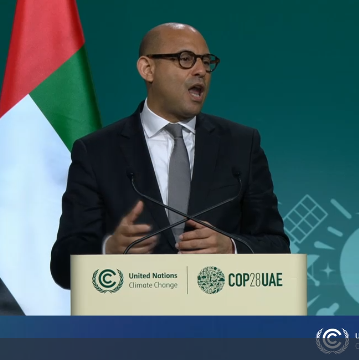
Where was the AOSIS group ?
” We were working hard to coordinate the 39 small islands developing states that are disproportionately affected by climate change and so we were delayed”, explained Anne Rasmussen, the representative of SAMOA on behalf the Small Islands Developing States .
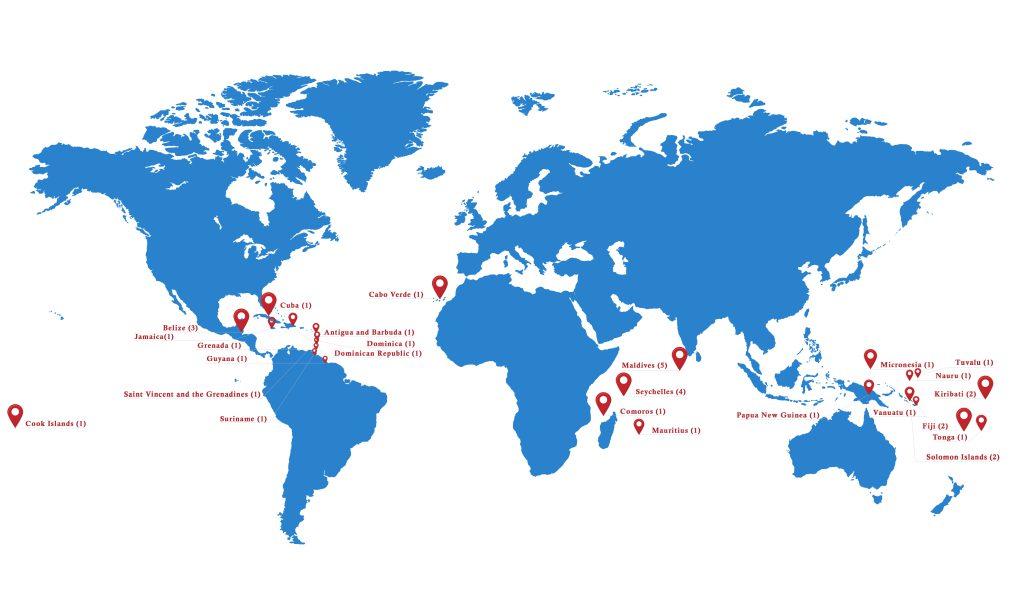
But why did countries members of the High Ambition Coalition or Beyond Oil and Gas Alliance not react, the two partner organizations of AOSIS’ members? Members like Spain, Colombia, France which were part of the last press conference approved the COP28 decision.
Before giving the floor to the representative of AOSIS, COP28 President, Sultan Al Jaber enshrined, the main actions quickly concluded a little bit earlier in the plenary which are the Global Stocktake, the Global goal on adaptation, the work plan on the just transition, mitigation, the operationalization of the loss and damage fund, and the engaging youth UNFCCC process. He called them a consensus.”
“We have language on fossil fuels in our final agreement, for the first time ever”, he pointed out after the adoption. His statement received 20 seconds of applause. But this text is not suitable for AOSIS and other delegations. So why did they approve the decision made by the UAE presidency?
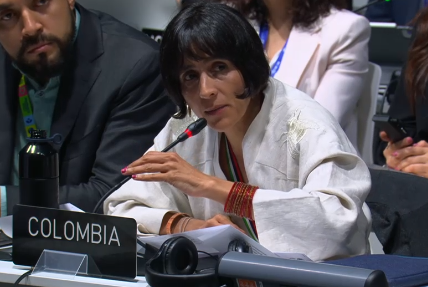
Susana Muhamad, minister of environment of Colombia gave her opinion on the matter in plenary. ” The text reflects the political reality of this plenary: “President Pedro defines the struggle of this century as a struggle between fossil fuels capital and life”, she reported. For the french minister of Energy Transition, Agnès Pannier-Runacher, the agreement adopted in Dubai is the culmination of a process.
“This is a victory for multilateralism, a victory for the climate, eight years after the Paris agreement,” described the french minister for energy transition. And she added: “This is an unprecedented result that sends a strong signal to all players and markets. During COP 28, several civil society actors rose up against the carbon market. The launch of an independent assessment study on climate action through carbon taxes was announced by Colombia, Kenya and France at a press conference at the end of COP28. “This (Dubaï) agreement, said the French minister, “resumes the conclusion of the Paris pact for peoples and the planet on innovative financing including taxation.”
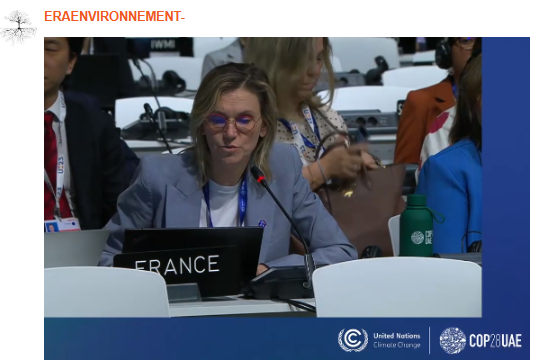
For the Small Islands Developing States ‘group and for several developing countries, the understanding of the agreement is different. On the Global Stocktake, “the paragraph on abatement” can be perceived in a way that underwrites further expansion. Phasing out of “inefficient” fossil fuel subsidies is problematic, creating loopholes that were not there before. We see step backward with inclusion of energy poverty and just transition as caveats“, explained the SAMOA delegate,in a statement to be read before the decision making. And she continued by analysing the language used in the text : “Inefficient is an issue for us and the inclusion of “transitional fuels” is also quite problematic.”
Throughout the UN climate talks, Al Jaber was heavily criticized by the international press and civil society for his statements on science in a webinar in november, but also for his professional activities in the oil field. At an impromptu conference early December during COP28 , he even denied his words and justified himself by emphasizing his belief in science.
“AOSIS came to this COP with one objective to ensure that the 1.5C is safeguarded in a meaningful way”, Rasmussen recalled . And she added: “Our ministers and leaders have been cleared, we cannot return home with a message that this process has failed us”.
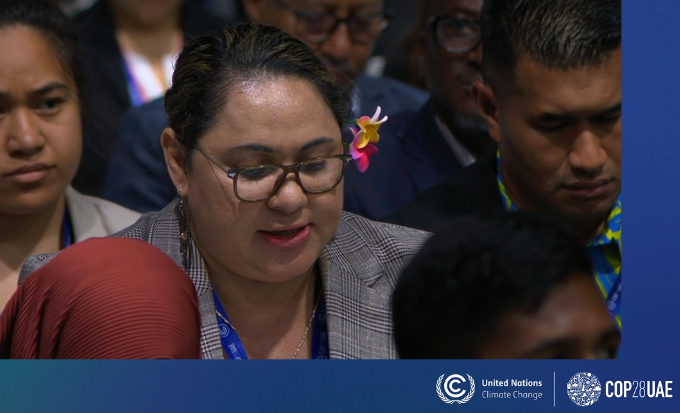
The Alliance of Small Island Developing States welcomed strong references to the science in the “draft text” which is included in the agreement. But for them, this text adopted by everyone without them not allow the balance to correct the curve of climate change. They referred especially to a paragraph on mitigation about collective progress towards achieving the purpose and long-term goals of the Paris Agreement. “Paragraph 28 (e) and (h) take us backward rather than forward,” said Rasmussen, referring to the use of carbon capture and storage. Rasmussen also raised the questions on the roadmap for 2025. “In paragraph 26 we do not see any commitment or even an invitation for Parties to peak emissions by 2025”. After reading the AOSIS statement, she received a standing ovation from all the plenary.
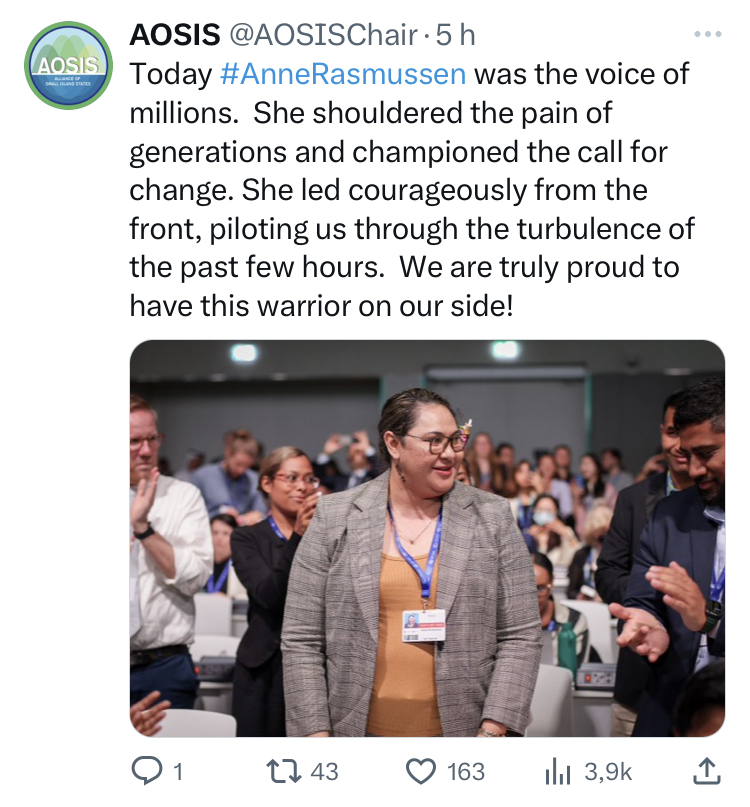
What to take away from the agreement ?
The UAE agreement indicates a tripling of global renewable energy capacity and a doubling of the global average annual rate of energy efficiency improvement by 2030. It also mentions “the abandonment of fossil fuels in energy systems in a fair, orderly and equitable manner, accelerating action during this critical decade, in order to achieve carbon neutrality, by 2050, in line with science and also advocating the acceleration of zero-emission and low-emission technologies, including, inter alia, renewable energy, nuclear, reduction and elimination technologies, such as carbon capture, use and storage, particularly in hard-to-eliminate sectors, and low-carbon hydrogen production.” For observers, these elements raise questions. The carbon neutrality deadline is hard to reach, according to delegations and observers.
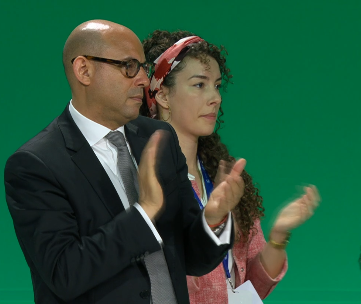
“After thirty years of climate negotiations, we finally come out this morning in Dubaï of fossilized COP entangled in the taboo of fossil fuels and completely drowned in their dependence on oil, gas and coal, the agreement adopted this morning finally marks a turning point that marks a moment, an important step by calling for the first time, countries to turn away from fossil fuels, it is a step to be welcomed, but it will be necessary to go further,” noticed Arnaud Gilles of World Wild Fund For Nature (WWF) France . He also raised concerns on the use of “climate falsehoods” in the agreement which to him were introduced in the deal by a fossil lobby of several countries. “The Dubaï accord provides for many regulatory breaches, such as the use of carbon storage technologies, but also what is called low-carbon energy, but what obviously hides fossil gas, which is absolutely not a transition, and which has nothing to do with a roadmap to fight climate change,”he underlined.
For Mohamed Adow, Director of Kenya-based PowerShift Africa Analysis Centre, climate finance remains a challenge. “The text calls for a transition away from fossil fuels in this crucial decade, but the transition is neither funded nor equitable,” he said. And he added: “At present, the rich countries whose emissions have created the crisis are refusing to pay their climate debt and are making sure that some of the world’s poorest are on their own”. For Maria Laura Rojas Valleja of the Transforma Institute in Colombia, progress has been made to bring the adaptation dimension to a sector level never seen before, for health, water and food systems, and the launch of the Losses and Damages Fund. But questions remain. ” There is always the unpleasant feeling that last-minute decision-making is not very transparent and that the interests of the most vulnerable, those with fewer emissions and responsibilities, end up not being taken into account,’ she explained. The next deadlines will be in Baku in Azerbaijan for COP 29 in 2024 and in Bélem in Brazil for COP 30 in 2025. “The next big battle will be nothing less than that of finance, at COP29 and keeping alive the hope and the goal of 1.5ºC at COP30,” she concluded.
By Houmi Ahamed-Mikidache




